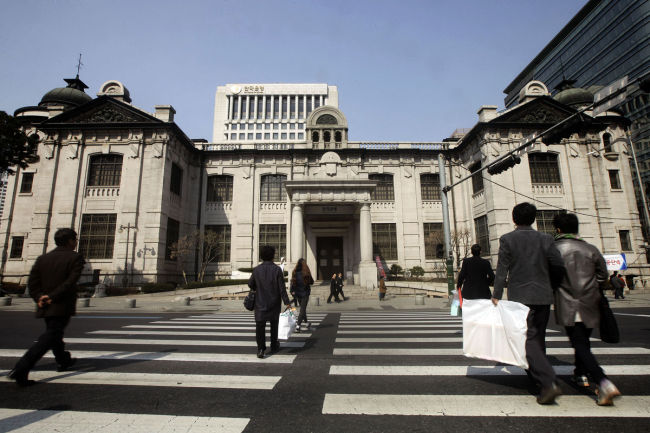Seoul struggles to stabilize won
Seoul needs balanced, timely currency policy
By Korea HeraldPublished : Feb. 22, 2016 - 14:38

A steep rise in the won-dollar exchange rate led government and central bank officials here last week to make a verbal intervention to curb what they saw as excessive volatility in the market.
“The Bank of Korea and the government believe fluctuations and volatility in the won-dollar exchange rate have become too excessive recently,” said a joint statement by the Finance Ministry and the BOK, pledging to take all available measures if needed.
The rate soared to 1,239.6 won -- the highest level in nearly six years -- during Friday’s trading before closing at 1,234.4 won, up 7.0 won from the previous day.
The value of the Korean currency against the greenback has decreased by about 5.3 percent so far this year amid global financial instability such as a possible interest rate hike in the U.S. and stock market routs in China and Japan.
The depreciation of the won is recently becoming steeper as concerns over geopolitical risks on the Korean Peninsula are rising following Pyongyang’s nuclear and missile tests and speculation is spreading that the BOK will eventually further cut its key rate held at a record low of 1.5 percent since June.
The devaluation of the won has both positive and negative effects on the Korean economy.
A weaker won helps enhance the price competitiveness of local manufacturing exporters that are struggling with slumping global demand and mounting challenges from competitors in China and other emerging countries. It also pushes up import prices, serving to ease deflationary pressures weighing on the economy.
An excessive loss of the currency value, however, will further prod foreign investors to pull their money out of the country’s equity and bond markets. Foreign investors, who have extended their longest streak of selling off Korean shares, are recently starting to dump won-denominated bonds.
Last Friday’s move by the government and the central bank apparently reflected their judgment that the capital outflow would continue to surge, precipitating the devaluation of the won, if they do not take deliberate action.
Some critics, however, note that policymakers have remained idle for too long to turn the tide in the currency movement.
Government and central bank officials have given the impression of tilting toward letting or guiding the won to continue losing its value.
Just a day before the verbal intervention, Finance Minister Yoo Il-ho said in a meeting with businessmen that it was difficult to view the latest fluctuations in the won-dollar exchange rate as “structural,” though he pledged to take quick action against any radical volatility in the market.
Experts say it is all the more necessary for Seoul to take a balanced and timely approach to changes in the value of the won, given an upcoming tightening of regulations by the U.S. administration against countries that it considers are tampering with foreign exchange rates.
The amendment to the Customs and Enforcement Act by U.S. Senators Michael Bennet, Orrin Hatch and Tom Carper, which now only needs to be signed by President Barack Obama to come into force, will impose punitive measures on countries suspected of currency manipulation.
Seoul has downplayed the possibility that Korea will be targeted by the legislation.
“It is not true that Korea is tampering with foreign exchange rates,” said a Finance Ministry official, asking not to be named. “Even so, it would be difficult to prove it.”
But many currency experts and economic commentators here indicate this stance may prove too naive, considering Korea is one of a handful of countries that have recorded considerable trade surplus with the U.S. and accumulated large sums of current account surplus. Korea’s current account surplus amounted to a record high of $105.9 billion last year, marking the third consecutive year in which it exceeded 6 percent of the country’s gross domestic product.
In a report released last year, the U.S. Treasury Department said Korea had been intervening in its foreign exchange market.
“The Korean authorities have intervened to resist won appreciation in the context of a large and growing current account surplus,” the report said. “We have made clear that the Korean authorities should reduce foreign exchange intervention, limiting it to the exceptional circumstance of disorderly market conditions, and allow the won to appreciate further.”
To clear or ease the U.S. concern, Seoul needs to take more effective measures to manage its current account surplus at an appropriate level and reduce fluctuations in the won-dollar exchange rate, experts note.
It will help stabilize the volatile currency market, if Seoul restores or expands currency swap lines with major economies, including Japan, they say.
By Kim Kyung-ho (khkim@heraldcorp.com)
-
Articles by Korea Herald



![[Herald Interview] 'Amid aging population, Korea to invite more young professionals from overseas'](http://res.heraldm.com/phpwas/restmb_idxmake.php?idx=644&simg=/content/image/2024/04/24/20240424050844_0.jpg&u=20240424200058)













![[KH Explains] Korean shipbuilding stocks rally: Real growth or bubble?](http://res.heraldm.com/phpwas/restmb_idxmake.php?idx=652&simg=/content/image/2024/04/25/20240425050656_0.jpg&u=)

